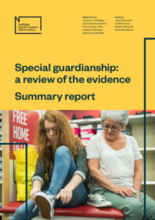Overview
A Special Guardianship Order (SGO) gives one or more individuals, usually family members, parental responsibility for a child who cannot live with their birth parents. Although the making of an SGO enables the person who holds the Order to exercise that responsibility ‘to the exclusion of all others’, the basic legal link between the child and their birth parents is preserved.
In the development of the policy framework for SGOs, there was a strong focus on people who were already caring for children – family members or foster carers in particular. However, they are now most frequently used as the Order made at the resolution of care proceedings. The use of SGOs is increasing: over 21,000 children [in the UK] have been placed with special guardians since 2010 (Harwin et al., 2019). The use of SGOs in situations where a child does not have a pre-existing relationship with the prospective guardians, and where such guardians identify themselves after care proceedings have begun, has raised questions about the lack of time, resources and evidence for local authorities and the courts to ensure the Order being made is clearly in the best long-term interests of the child.
In July 2018, the former President of the Family Division invited the Family Justice Council to draft authoritative guidance to assist courts in making SGOs and specifically to address the issues raised in the Court of Appeal judgment in the case of Re P-S (the case is explained in more detail below). This rapid evidence review is intended to contribute to the drafting of that guidance and to help inform decision-making by frontline practitioners. The review addresses three overarching questions relating to special guardianship:
- What do we know about placement stability and child outcomes?
- What support is or should be made available for children and their carers?
- What do we know about and what can we learn from current implementation of special guardianship?
The questions have been addressed by consulting with social workers, lawyers, Cafcass officers and representatives of NGOs; undertaking a review of the research literature specific to special guardianship; and undertaking a review of the international research evidence on kinship care.
We conclude that special guardianship continues to be an important permanence option ‘for the right child and the right family’. But for this to be so, the system as a whole must operate in a coherent, timely, evidence-informed way and this requires changes in mindset, regulations and protocols.
The issues identified in our review are a combination of systemic, policy and practice issues. There has been a major shift in focus from the original policy framework for SGOs being made as a result of a private law application by the child’s current and established carers, to the extensive use of the court’s power to make the order under ‘its own motion’ during care proceedings. SGOs were not primarily designed to be used in this way, and this presents challenges for local authorities and the courts in providing special guardians with adequate preparation and support for the long-term consequences of this life-changing responsibility.
As it currently operates, special guardianship is also not appropriately aligned with best practice in other forms of child placement such as adoption and foster care – a serious issue when children share similar issues such as abuse and neglect and the birth parents’ lack of capacity to safely and responsibly care for their child.

